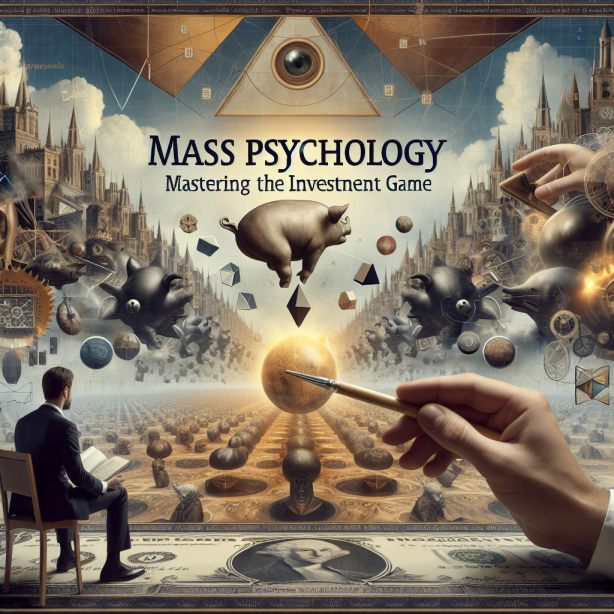
Unriddling the Enigma: Mass Psychology Overview
Updated May 29, 2024
Introduction
Mass psychology, also known as mob psychology or crowd psychology, explores how large groups of people influence an individual’s behaviour. It delves into the dynamics of group behaviour and how collective thought processes can shape individual actions and decisions. This concept is particularly relevant in the context of financial markets, where investor behaviour can often be driven by the collective sentiment of the market, leading to phenomena such as market bubbles and crashes.
The concept of mass psychology is not new. It has been studied extensively in various contexts, including political movements, social behaviour, and market dynamics. For instance, the Austrian psychoanalyst and psychiatrist Wilhelm Reich, in his book “The Mass Psychology of Fascism,” attempted to explain how political ideologies and authoritarian regimes can manipulate mass psychology to gain and maintain power.
In the context of financial markets, crowd psychology can significantly impact market trends. The collective sentiment of investors, driven by factors such as news, economic indicators, and market speculation, can create influential market trends. When investors collectively become overly optimistic, they can drive up prices beyond what the underlying fundamentals justify, creating a market bubble. Conversely, when investors collectively become excessively pessimistic, they can drive down costs below their intrinsic value, leading to a market crash.
Understanding mass psychology can be a powerful tool for investors. By recognizing the signs of collective euphoria or panic, investors can make more informed decisions and potentially avoid getting caught up in market bubbles or crashes. However, predicting and navigating the influence of mass psychology on markets is more of an art than a science, requiring a deep understanding of market dynamics and investor behaviour.
The Power of the Crowd: A Historical Dive into Mass Psychology
To delve deeper into the overview of Mob Psychology: Unveiling the Enigma, it’s essential to examine historical instances where it played a significant role. Remember the 16th and 17th centuries, when witch hunts were rampant across Europe and North America? The mass hysteria that led to the persecution and execution of thousands of alleged witches can be traced back to mass psychology.
People, driven by fear and superstition, collectively vilified and scapegoated individuals, predominantly women, labelling them as witches. The mass fear and panic created an environment where rational thought was abandoned, and people blindly followed the crowd’s sentiment. This was an early yet grim demonstration of mass psychology, where collective fear overrode individual reasoning.
Now, let’s scrutinize compelling cases illustrating Mass Psychology in action. These cases resemble historical instances where collective fear and superstition compelled people to scapegoat individuals, revealing how irrationality prevails when the masses blindly succumb to prevailing sentiments.
The witch hunts of the 16th and 17th centuries were a dark period in human history, marked by fear, superstition, and mass hysteria. This was a time when the collective fear of the unknown overpowered rational thought, leading to the persecution and execution of thousands of innocent individuals, predominantly women, who were labelled as witches.
The mass hysteria that fueled the witch hunts was not a spontaneous occurrence. It resulted from a complex social, religious, and political interplay. The Church, in its attempt to consolidate power, propagated the belief in witchcraft and the devil. This, coupled with the societal anxieties of the time, created a fertile ground for mass hysteria.
The witch hunts serve as a stark reminder of the power of mass psychology. When fear and superstition take hold of a group, it can lead to irrational behaviour and devastating consequences. This phenomenon is not confined to the past. Even in the modern world, we can see instances where mass psychology influences group behaviour.
Take, for instance, the stock market crashes of 1929 and 2008. In both cases, a collective fear gripped investors, leading to panic selling and a sharp decline in stock prices. The fear was so pervasive that it overrode rational decision-making, causing investors to sell their stocks even when it was not in their best interest.
In conclusion, understanding herd mentality is crucial in various fields, from politics to finance. By studying historical instances like witch hunts and stock market crashes, we can gain valuable insights into how mass psychology works and how it can influence group behaviour. This knowledge can help us make more informed decisions and potentially prevent the negative consequences of mass hysteria.
A Mass Psychology Overview in the 21st Century
The rise of populism in the 21st century is a testament to the enduring influence of mass psychology. Populist leaders, adept at manipulating public sentiment, often capitalize on their followers’ collective anxieties and fears to gain power and influence. This mass psychology overview shows how these leaders tap into the collective psyche to further their political agenda.
A prime example of this is the Brexit referendum in the United Kingdom. Populist leaders capitalized on the collective fear of immigration and economic instability, using it as a springboard to influence individual voting decisions. The mass psychology of fear and uncertainty was manipulated, resulting in a majority vote to leave the European Union. This mass psychology overview highlights the power of collective anxiety and how it can shape political landscapes.
However, the influence of mass psychology is not confined to politics. It also plays a significant role in shaping consumer behaviour. Consider the phenomenon of viral marketing, where a product or idea spreads rapidly among consumers due to the power of social influence. This mass psychology overview clearly shows how collective behaviour can drive market trends.
In social media, mass psychology can also lead to the rapid spread of misinformation or “fake news”. The collective desire for sensational and controversial content can override rational judgment, leading to the dissemination and acceptance of unverified information. This mass psychology overview underscores the importance of understanding the power of the crowd in the digital age.
The influence of mass psychology is a powerful force that shapes our decisions and actions, from the political arena to the marketplace. By understanding the dynamics of mass psychology, we can make more informed decisions and potentially mitigate the negative consequences of collective behaviour.
The Power of Social Media: From Arab Spring to GameStop Shares
In the digital age, mass psychology has found a new playing field – social media. The Arab Spring, a series of anti-government protests and uprisings in the Middle East sparked by social media, showcases the role of mass psychology in shaping political movements. The collective dissatisfaction and desire for change spread rapidly across various countries, leading to significant political shifts in the region.
More recently, the GameStop shares frenzy, driven by a collective sentiment of retail investors on Reddit, led to a dramatic surge in the company’s stock price. This incident underscores the power of mass psychology in influencing market trends and investor behaviour.
Conclusion: The Enigma of Mass Psychology
In delving into the captivating realm of mass psychology, we unravel a profound and intricate tapestry that shapes group behaviour and decision-making. Be it the dark chapters of historical witch hunts or the contemporary landscapes of political movements and financial markets, the omnipotence of mass psychology looms large, demanding our attention and respect.
To culminate our exploration of mass psychology, the profound impact on collective behaviour and decision-making becomes unmistakably evident. The influence is pervasive and transformative, from the gripping narratives of historical witch hunts to the nuanced dynamics of modern political movements and market trends. Recognizing this potent force equips us with a formidable tool—an understanding that transcends the superficial layers of our social and financial environment.
Indeed, once unriddled, the enigma of mass psychology unfolds as a captivating narrative that goes beyond mere comprehension. It grants us access to the intricacies of collective behaviour, exposing the threads that weave the fabric of our shared actions and decisions. In the vast tapestry of human experience, whether navigating the currents of political upheavals, market fluctuations, or societal phenomena, the significance of mass psychology remains irrefutable. It is the essential puzzle piece, the key to deciphering the complexities that define our multifaceted human behaviour.
Embarking on a Deeper Odyssey:
As we conclude this exploration, the journey into the enigma of mass psychology beckons us to embark on a more profound odyssey. Beyond comprehension lies the realm of mastery, where understanding this powerful force evolves into a tool for informed decision-making. The enigma persists, inviting us to delve further, as every revelation serves not only as a testament to our shared history but as a guidepost for navigating the uncharted territories of our collective future. In the unfurling chapters of our societal narrative, the enigma of mass psychology stands as both a challenge and an invitation—an invitation to fathom the depths of our collective psyche, armed with the wisdom to navigate the evolving landscapes of our interconnected world.












